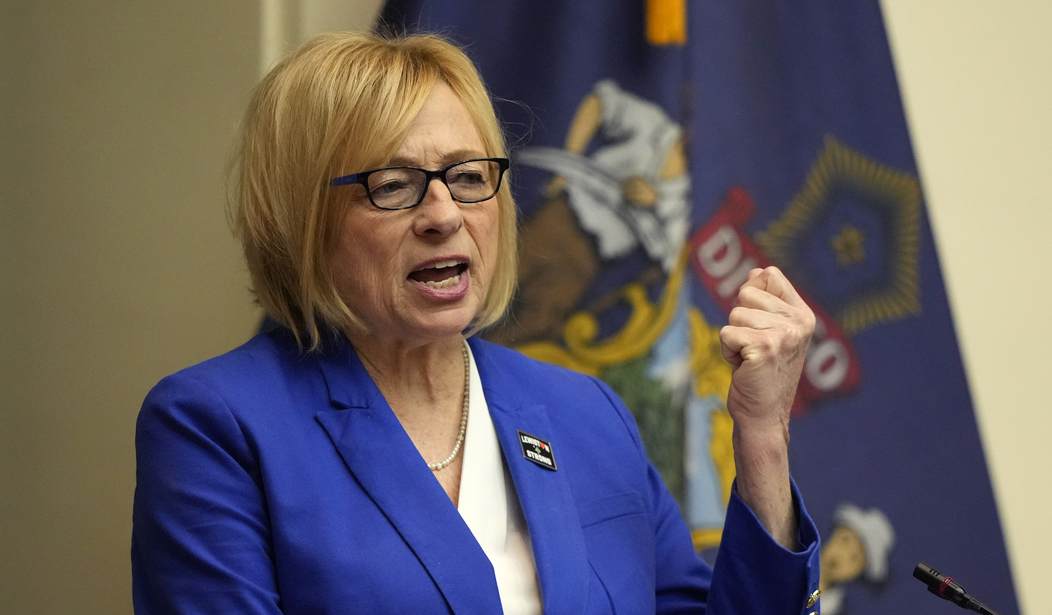
By Jennifer Oliver O’Connell. Media: Redstate
In what on the surface looks like a capitulation by the Trump administration, a settlement has been reached between the state of Maine and the United States Department of Agriculture (USDA) over funding freezes as a result of the current investigation of the Maine Department of Education for Title IX violations. Maine Gov. Janet Mills has refused to acknowledge President Donald Trump’s executive orders recognizing that there are only two genders: male and female, and protecting women’s sports from infiltration by transgendered men. In a standoff in February between Trump and Mills, Mills refused to restrict her DOE from allowing boys who identify as girls to participate in girls’ sports teams. So, Maine’s girls continue to suffer humiliating losses like this.
Maine continues to be in the crosshairs over this because the Department of Justice and the Department of Education are still investigating Maine for Title IX violations.
President Donald Trump’s administration on Friday agreed to halt all efforts to freeze funds intended for a Maine child nutrition program after initially suspending those dollars due to a disagreement between the state and Trump over transgender athletes.
In response, the state will drop its lawsuit that had been filed against the U.S. Department of Agriculture, Maine Attorney General Aaron Frey announced.
“It’s unfortunate that my office had to resort to federal court just to get USDA to comply with the law and its own regulations,” Frey said in a statement. ”But we are pleased that the lawsuit has now been resolved and that Maine will continue to receive funds as directed by Congress to feed children and vulnerable adults.”
An email message seeking comment was sent Friday to the Agriculture Department.
The settlement closes a dispute first sparked by the federal government’s decision to freeze federal funds to Maine for certain administrative and technological functions in the state’s schools.
That would have to do with funds slated for technical and administrative programs to jails, universities, and such. No one was taking any child’s lunch away or affecting vulnerable adults. But legacy media still chose to frame it in that way.
In the settlement, the USDA agreed to not withhold funding from Maine based on alleged violations of Title IX without first following all legally required procedures. In return, Maine filed a voluntary dismissal of its claims that the USDA’s funding freeze from earlier this month was unlawful.
On April 2, U.S. Secretary of Agriculture Brooke Rollins sent a letter informing Maine Gov. Janet Mills that the USDA was freezing funding for certain Maine educational programs over the Trump administration’s findings that the state violated Title IX.
The day after Rollins sent the letter, the Maine Department of Education’s Child Nutrition Program was unable to access several sources of federal funding, all of which are necessary to feed children and vulnerable adults. The Maine DOE then informed Maine’s Total Coverage on April 4 that the USDA funding to support administrative staff who operated school nutrition programs, as well as funding for certain other grant programs that take place outside of schools was not available to the state.
After the USDA announced the freezing of the funds, a federal judge put the kibosh on the freeze, not based on the lack of fairness or the language of Title IX, but as my colleague Ward Clark wrote, simply on procedural grounds. The Trump administration and Maine could have gone round and round on this one, but chose not to. While the reasons have not been stated, no doubt it has much to do with Maine’s limited ability to fight a lawsuit and the multiple investigations into its Title IX violations. The framing of starving children and the homeless, despite being untrue, was also bad optics. So, the Trump administration agreed to relinquish the battle over this particular set of funds if Maine dropped its lawsuit to try and restore the funds.
So, consider it a stalemate. But this did not stop the ridiculous Gov. Mills from claiming victory and talking tough.
“A few months ago, I stood in the White House and when confronted by the president of the United States, I told him I’d see him in court. Well, I did see him in court and we won,” Mills said Friday. “It’s good to feel a victory like this. We took them to court, and we won.”
Most of the legacy media also framed this settlement as a victory for Maine, which could not be further from the truth.
Press Herald Overstates Maine’s Victory in USDA Settlement
Frames the settlement as a clear win for Maine, emphasizing Gov. Janet Mills’ quote, “we won,” while downplaying the ongoing Title IX lawsuit that still threatens larger federal funding.
Highlights Mills’ and Attorney General Aaron Frey’s celebratory tone without providing perspectives from the USDA or Trump administration, creating a one-sided narrative.
Uses emotionally charged language like “bullying tactics” to describe the Trump administration’s actions, potentially skewing reader perception against the federal government.
Minimizes the scope of the $3 million in unfrozen funds by focusing on the state’s legal success, ignoring the broader context of $250 million still at risk in the separate Title IX case.
Omits discussion of potential policy changes on transgender athletes, despite Mills’ earlier acknowledgment that the topic is “worthy of discussion,” limiting the depth of the issue’s portrayal.
That sums it up well. While Mills and her state attorney are taking a victory lap, and legacy media is painting an inaccurate narrative, Maine girls continue to be erased, and Maine still has a target on its back. Federal funds from other agencies could be pulled at any time, so if it is a “victory,” it’s a pyrrhic one.




























































































Discussion about this post